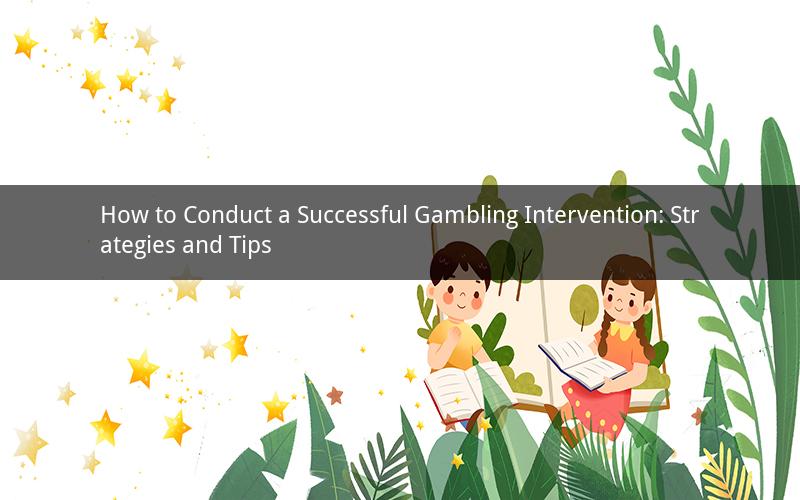
Introduction:
Gambling addiction is a serious issue that affects millions of individuals worldwide. It can lead to financial, emotional, and social problems, making it crucial for loved ones to intervene and help the addict. This article provides detailed guidance on how to conduct a successful gambling intervention, offering strategies and tips to ensure the best possible outcome.
1. Understand the Problem:
Before conducting an intervention, it is essential to have a clear understanding of the gambling addiction. Research the signs and symptoms, recognize the consequences of the addiction, and gather information about the individual's gambling habits. This knowledge will help you approach the intervention with confidence and empathy.
2. Assemble a Support Team:
A successful gambling intervention involves a support team consisting of close friends, family members, and professionals. Choose individuals who are committed to helping the addict and have a strong relationship with them. Ensure that everyone involved understands their role and responsibilities during the intervention.
3. Set a Time and Place:
Select a suitable time and place for the intervention. Choose a private and comfortable setting where the addict will feel safe and less likely to become defensive. Make sure the location has enough space for everyone to sit comfortably and speak openly.
4. Prepare an Intervention Plan:
Create a detailed plan for the intervention, including what will be said, how it will be said, and the expected outcomes. Here are some key elements to include:
a. Open with Compassion: Begin the intervention by expressing your love and concern for the addict. Use "I" statements to avoid sounding accusatory.
b. Present the Evidence: Share specific examples of the addict's gambling behavior, its consequences, and the impact it has had on their life and the lives of those around them.
c. Discuss the Consequences: Highlight the negative consequences of the addiction, such as financial problems, legal issues, and strained relationships.
d. Offer Support: Emphasize that the support team is willing to help the addict through this challenging time. Discuss available resources, such as counseling, support groups, and rehabilitation programs.
e. Encourage a Positive Outcome: Encourage the addict to accept help and commit to making a change. Offer a clear plan of action and follow-up support.
5. Follow Through with the Intervention:
On the day of the intervention, follow the prepared plan. Ensure that everyone in the support team is present and ready to participate. Begin by expressing your love and concern for the addict. Then, present the evidence, discuss the consequences, and offer support.
6. Encourage Participation:
Encourage the addict to share their feelings and thoughts. Be patient and listen actively. Avoid interrupting or becoming confrontational. Remember that the goal is to help the addict understand the severity of their situation and commit to seeking help.
7. Offer Immediate Help:
After the intervention, offer immediate help to the addict. This may include scheduling appointments with counselors, support groups, or rehabilitation programs. Provide transportation, if needed, and ensure that the addict has a safe place to stay.
8. Follow Up and Support:
Continue providing support to the addict after the intervention. Attend counseling sessions together, attend support group meetings, and stay in touch regularly. Encourage the addict to maintain their commitment to change and offer encouragement along the way.
9. Be Patient and Persistent:
Recovery from gambling addiction is a long and challenging process. Be patient and persistent in your efforts to support the addict. Understand that setbacks may occur, but remain focused on the ultimate goal of helping the individual overcome their addiction.
10. Take Care of Yourself:
Lastly, take care of your own well-being during this process. Interventions can be emotionally draining, so ensure that you have a strong support system in place for yourself. Seek help from friends, family, or professionals if needed.
Q1: What are the signs and symptoms of gambling addiction?
A1: Signs and symptoms of gambling addiction include lying about gambling activities, borrowing money to finance gambling, feeling restless or irritable when unable to gamble, and prioritizing gambling over other responsibilities.
Q2: How can I approach a loved one about their gambling addiction?
A2: Approach the subject with empathy and concern. Use "I" statements to express your feelings without sounding accusatory. Choose a private and comfortable setting for the conversation, and be prepared to listen actively.
Q3: What resources are available to help someone with a gambling addiction?
A3: Resources include counseling services, support groups (such as Gamblers Anonymous), rehabilitation programs, and financial counseling. Research local options and discuss them with the addict during the intervention.
Q4: How can I support a loved one during their recovery process?
A4: Support your loved one by attending counseling sessions, attending support group meetings, and providing a safe, supportive environment. Encourage them to maintain their commitment to change and offer encouragement along the way.
Q5: What should I do if the addict refuses to participate in the intervention?
A5: If the addict refuses to participate, consider seeking the help of a professional interventionist. They can provide guidance and support to ensure a successful intervention, even if the addict is initially unwilling to participate.